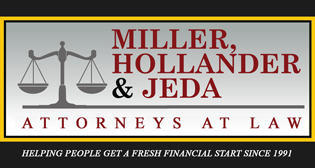Frequently Asked Questions About Florida Bankruptcy
Answers from a knowledgeable and highly experienced bankruptcy law firm
Bankruptcy may be the best way for individuals to get rid of some, if not all, of their debt and to restart their financial lives. You may also be able to keep all of your property, including your home and your vehicle. The key to any bankruptcy is a full and complete disclosure of what you own, what you owe and anything that may be owed to you.
We have put together some of the most commonly asked questions to address some of your immediate concerns. We know you will have additional questions regarding your unique situation. We are happy to meet with you for a free, confidential appointment at any of our three convenient locations in Southwest Florida to answer your legal questions.
Begin again with a Florida law firm dedicated solely to handling your bankruptcy needs
The law firm of Miller, Hollander & Jeda concentrates its practice in bankruptcy law, asset protection and financial problems. If you are in financial trouble, we may be able to help. Let us guide you through the practical steps to get a fresh start. Call us at 239.775.2000 or contact Miller, Hollander & Jeda online today to schedule a free, private and confidential consultation at any of our three locations in Southwest Florida.
Which kind of bankruptcy should I file?
This is a difficult question to answer without sitting down for a consultation to review your situation and the different types of bankruptcy. Generally, Chapter 7 is a better way to deal with only unsecured debt, or when you simply want to walk away from everything and start over. Chapter 13 is more complex — you'll have to make plan payments for up to five years, but it can allow you to save your home from foreclosure and protect your other assets.
Back to top
Will filing bankruptcy stop creditor harassment?
Once you submit the required paperwork to the bankruptcy court, the court issues an automatic stay. This is like a restraining order against your creditors and prevents them from contacting you to recover money, seize your property or place liens on your home. We have seen the relief that clients experience when they are no longer bothered by creditors.
Back to top
My case has been filed for some time and I am still receiving collection efforts from a creditor. What should I do?
Your bankruptcy attorney can help resolve ongoing collection efforts. Obtain the contact information from the offending creditor so that we may serve them with a formal demand to cease and desist from contact. If collection efforts continue despite the cease and desist demand, you need to document all dates and times of contact. We can utilize that information to sanction the offending creditor before the bankruptcy court.
Back to top
Can I get rid of a second or third mortgage or equity line debts?
Many homeowners have seen a substantial decrease in the value of their homes. If this is the case, you may have a first mortgage in which you owe more than the home is worth. Even though you owe more on the first mortgage, you also have payments owed on a second or third mortgage. By filing Chapter 13 bankruptcy, you may be able to get rid of your second or third mortgage payment or home equity line and never have to repay it.
Back to top
Will I be able to get credit again after I file bankruptcy?
Yes. Most of our clients receive pre-approved credit applications in the mail shortly after their bankruptcy is discharged. However, you will probably have to pay higher interest rates.
Back to top
Do I have to hire a lawyer to file bankruptcy?
No. You have the right to represent yourself in your bankruptcy case; however, there are many pitfalls for individuals and inexperienced bankruptcy lawyers. Now that the law has changed, there are even more mistakes that can be made. Therefore, it is best to seek the advice and counsel of an experienced bankruptcy attorney who is qualified to guide you through the process.
Back to top
Are all my debts eliminated in bankruptcy?
Not everything can be discharged in bankruptcy. You may not be able to discharge student loans, back child support or certain taxes. Debts such as these and others may have to be repaid. Our lawyers can tell you what part, if any, of your debt is non-dischargeable.
Back to top
What is Chapter 7 bankruptcy?
This is a liquidating bankruptcy, formerly called straight bankruptcy. Its principal advantage is that in a personal Chapter 7 or a business Chapter 7 filing, you come out without any future personal obligations for your discharged debts.
Back to top
What is Chapter 11 bankruptcy?
Chapter 11 bankruptcy is a reorganization generally used by businesses or by individuals with substantial assets that would be lost in a straight bankruptcy. In a Chapter 11 proceeding, creditors are temporarily stopped from taking any action while the debtor tries to work out a plan of reorganization and debt settlement. The creditors vote on the proposed plan and it must then be approved by the court. This type of proceeding is designed to preserve an ongoing business that would otherwise be lost in a liquidation bankruptcy.
Back to top
What is Chapter 12 bankruptcy?
Chapter 12 bankruptcy is a proceeding specially designed for family farmers and fisherman. It has special provisions that are a combination of Chapter 11 and Chapter 13 bankruptcies.
Back to top
What is Chapter 13 bankruptcy?
Chapter 13 bankruptcy is a repayment plan for individuals and sole proprietorships who have regular incomes. In Chapter 13, you must propose in good faith to pay back all or part of your debts from future income over a period of time. If the court approves the plan of payment and all of the payments are made, the debts are settled in this manner, even if your creditors are not willing to go along with the plan. If you make the payments as required, you will not have to surrender your property to a trustee and you can keep everything that you own. Chapter 13 can only be used by an individual and only if your debts do not exceed certain limits.
Back to top

